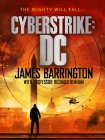Cyberstrike, James Barrington [short story to read .TXT] 📗

- Author: James Barrington
Book online «Cyberstrike, James Barrington [short story to read .TXT] 📗». Author James Barrington
Sadir, of course, was not a diabetic, and nor was he suffering from any other form of illness. He had ordered several different activation periods from Vektor and anticipated having to use only two of the remaining vials in America because the attacks there would not be martyrdom operations, or al-amaliyat al-istishhadiya, and he and the other jihadists had every intention of walking away afterwards. But there would be three exceptions to that. There were two people who would become involuntary shahids and who would have to imbibe the nanobot cocktail unwittingly – that was an integral and essential part of his plan. And there was one volunteer who would certainly not survive the encounter Sadir had planned for him, and so there would be no need to provide him with the lethal fluid.
A well-placed contact in Riyadh, a man known to Rashid and who was sympathetic to ISIS and its aims, had come up with several helpful ideas and, more importantly, the contact details of several people in America, dedicated and committed volunteers for the cause, who would be glad to provide material assistance. They were, the man in Riyadh had told Sadir the first time they met, all on the same side and all facing the same enemy, the Great Satan. And the beating heart of that hated beast was Washington D.C.
The city itself is something of an anomaly.
It’s located within the geographical boundaries of the United States of America but it’s not a part of any of the fifty states. The Residence Act, signed in July 1790, mandated the creation of a capital and federal district beside the Potomac River to form the seat of government for the newly independent fledgling nation, and the City of Washington was founded the following year. Today, the federal district extends to just over sixty-eight square miles in total, seven square miles of which are a part of the Potomac River so the land area is only sixty-one square miles, meaning that in global terms Washington D.C. is very slightly smaller than Lichtenstein. It encompasses the original settlements of Alexandria and Georgetown as well as land donated by the neighbouring state of Maryland. The original district also included a part of Virginia, but Congress returned this land, including the city of Alexandria, to the state in 1846.
With a population of over 700,000 residents, a number that swells to more than one million people every day of the working week, it can get extremely crowded, which was just one of the reasons why Sadir had chosen it as his base for the American operation. The other reasons were rather more compelling.
He had guessed that he, and almost anyone he associated with, would be likely to attract attention in America because of the colour of their skin and, more importantly, because of the identity of the nation that had issued his passport. Although the events of 9/11 were no longer fresh in the minds of most Americans, their memories were long and the identities of the perpetrators of that astonishingly successful attack had cast an almost permanent suspicion over the activities of anyone born in the Middle East or carrying a passport from that part of the world.
He would undeniably have been more noticeable had he selected somewhere in small-town America as his residence, and so Sadir had decided from the start that the best place for him to hide was in one of the most crowded cities in the country, on the same basis that the best place to hide a tree is in a forest.
What he did not know was whether or not he had managed to escape detection, but because he always took precautions when on the move and when meeting other people and had never seen the slightest sign of anybody following him or apparently taking any interest at all in what he was doing, he assumed he was still some way below the radar.
Which at that moment he was, but that was about to change.
Chapter 23
Cheltenham, Gloucestershire
‘Is this line secure?’
Ben Morgan had no idea who the man was, but because he had called his work mobile rather than his personal phone, he assumed it was an official call, not least because that number wasn’t published anywhere outside the various classified directories. So at least he was reasonably certain that he wasn’t about to be told that the caller understood he had had an accident that wasn’t his fault. In fact, Morgan had discounted that possibility as soon as he had heard the man’s voice: most of the desperate ambulance-chasing solicitors who resorted to that kind of pointless cold-calling employed young girls to read from a carefully prepared script at irritated people who had far better things to do than listen to such rubbish.
But whoever the caller was, what he had asked wasn’t a sensible question.
‘These days,’ Morgan replied, quite sharply, ‘no mobile phone call is secure unless both the caller and the recipient are using encrypted phones like the Enigma, Blackphone or Blackview. This phone was given to me by the government, so it’s just a plain vanilla mobile, because encrypted phones and the encryption service cost money and the





Comments (0)